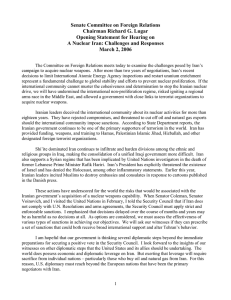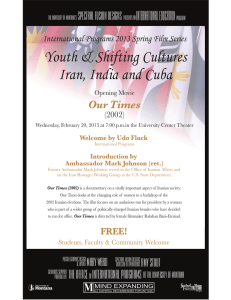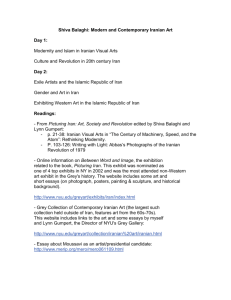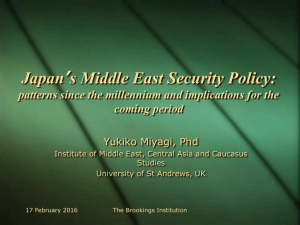The RAND Corporation is a nonprofit institution that helps improve... decisionmaking through research and analysis.
advertisement
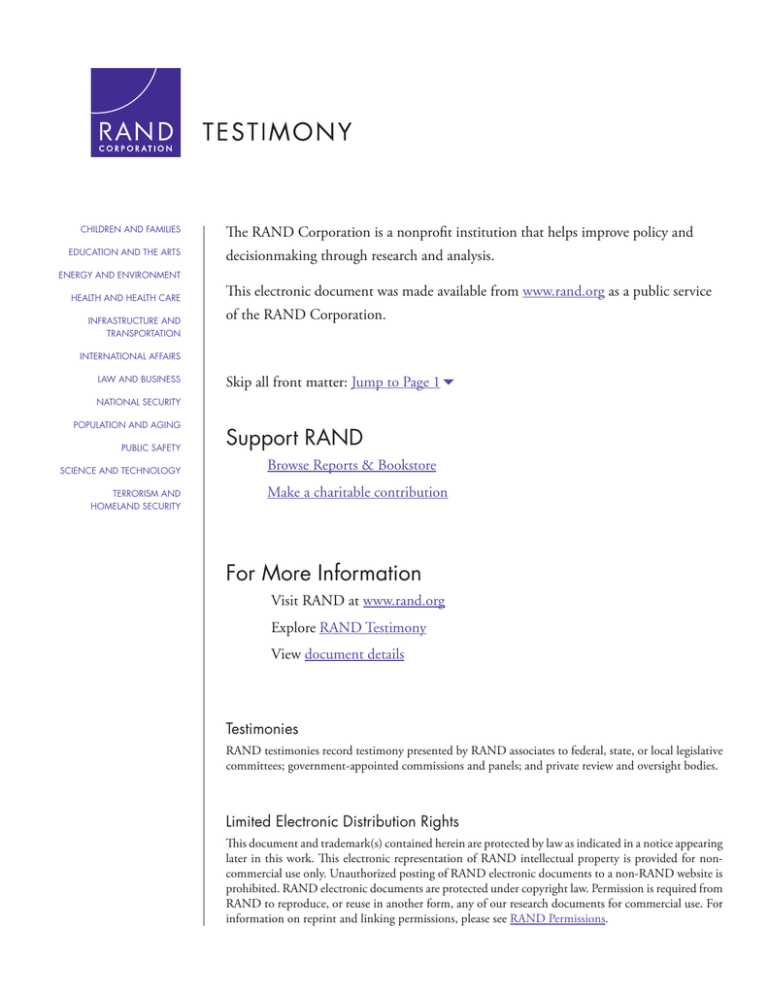
C O R P O R AT I O N CHILDREN AND FAMILIES EDUCATION AND THE ARTS The RAND Corporation is a nonprofit institution that helps improve policy and decisionmaking through research and analysis. ENERGY AND ENVIRONMENT HEALTH AND HEALTH CARE INFRASTRUCTURE AND TRANSPORTATION This electronic document was made available from www.rand.org as a public service of the RAND Corporation. INTERNATIONAL AFFAIRS LAW AND BUSINESS Skip all front matter: Jump to Page 16 NATIONAL SECURITY POPULATION AND AGING PUBLIC SAFETY SCIENCE AND TECHNOLOGY TERRORISM AND HOMELAND SECURITY Support RAND Browse Reports & Bookstore Make a charitable contribution For More Information Visit RAND at www.rand.org Explore RAND Testimony View document details Testimonies RAND testimonies record testimony presented by RAND associates to federal, state, or local legislative committees; government-appointed commissions and panels; and private review and oversight bodies. Limited Electronic Distribution Rights This document and trademark(s) contained herein are protected by law as indicated in a notice appearing later in this work. This electronic representation of RAND intellectual property is provided for noncommercial use only. Unauthorized posting of RAND electronic documents to a non-RAND website is prohibited. RAND electronic documents are protected under copyright law. Permission is required from RAND to reproduce, or reuse in another form, any of our research documents for commercial use. For information on reprint and linking permissions, please see RAND Permissions. Testimony Rouhani’s Election Regime Retrenchment in the Face of Pressure Alireza Nader RAND Office of External Affairs CT-394 June 2013 Testimony submitted before the House Foreign Affairs Committee, Subcommittee on the Middle East and North Africa on June 18, 2013 This product is part of the RAND Corporation testimony series. RAND testimonies record testimony presented by RAND associates to federal, state, or local legislative committees; government-appointed commissions and panels; and private review and oversight bodies. The RAND Corporation is a nonprofit research organization providing objective analysis and effective solutions that address the challenges facing the public and private sectors around the world. RAND’s publications do not necessarily reflect the opinions of its research clients and sponsors. is a registered trademark. Published 2013 by the RAND Corporation 1776 Main Street, P.O. Box 2138, Santa Monica, CA 90407-2138 1200 South Hayes Street, Arlington, VA 22202-5050 4570 Fifth Avenue, Suite 600, Pittsburgh, PA 15213-2665 RAND URL: http://www.rand.org To order RAND documents or to obtain additional information, contact Distribution Services: Telephone: (310) 451-7002; Email: order@rand.org Alireza Nader1 The RAND Corporation Rouhani’s Election: Regime Retrenchment in the Face of Pressure 2 Before the Committee on Foreign Affairs Subcommittee on the Middle East and North Africa House of Representatives June 18, 2013 Chairman Ros-Lehtinen, Ranking Member Deutch, and members of the Subcommittee, thank you for allowing me to appear before you today to speak about the Iranian presidential election and policy options for the United States going forward. Hassan Rouhani’s election as president demonstrates the Iranian people’s frustrations and deep opposition to their leaders’ decisions. His election is repudiation of the policy of “resistance” on the nuclear program pursued by Supreme Leader Ayatollah Ali Khamenei and President Mahmoud Ahmadinejad, which has led to Iran’s growing isolation and its economic devastation. The election may also show that U.S. pressure against Iran is beginning to pay off. Iran’s economic crisis played a significant role in Rouhani’s election. Iran’s continued progress on the nuclear program has been very costly; it has resulted in a sharp deterioration of the economy due to sanctions and a marked decline in the average Iranian’s standard of living. The Iranian population has borne the brunt of sanctions, but the regime has also come under tremendous pressure. Its over-dependence on energy revenues has made it vulnerable to U.S. and international sanctions that have reduced oil and natural gas exports. Rouhani’s presidency may provide a better opportunity to solve the nuclear crisis through diplomacy. His past experience as a capable nuclear negotiator and a moderate on foreign policy is encouraging. Iran’s foreign policy may be ultimately controlled by Supreme Leader Ayatollah Khamenei, and it will not change dramatically. For example, Iran is unlikely to abandon its support for the Syrian regime. But Rouhani will nevertheless have an opportunity to reshape Iran’s position on the nuclear program, as he will appoint Iran’s nuclear negotiator and other key figures. 1 The opinions and conclusions expressed in this testimony are the author’s alone and should not be interpreted as representing those of RAND or any of the sponsors of its research. This product is part of the RAND Corporation testimony series. RAND testimonies record testimony presented by RAND associates to federal, state, or local legislative committees; government-appointed commissions and panels; and private review and oversight bodies. The RAND Corporation is a nonprofit research organization providing objective analysis and effective solutions that address the challenges facing the public and private sectors around the world. RAND’s publications do not necessarily reflect the opinions of its research clients and sponsors. 2 This testimony is available for free download at http://www.rand.org/pubs/testimonies/CT394.html. 1 There is still enough time and space for the U.S. policy of sanctions and diplomacy to succeed. But negotiations between the P5+1 (United States, United Kingdom, France, Russia, China, and Germany) and Iran could fail if the Iranian regime perceives sanctions as being geared toward regime implosion and overthrow, rather than a way to achieve a diplomatic solution. U.S. policy has to be balanced to include not only pressures, but a dignified way for the regime to compromise. Washington and its allies should be prepared to offer Iran a deal that includes the recognition of Iran’s declared right to enrich uranium and a lifting of the harshest sanctions in return for verifiable limitations on the nuclear program. In addition, the United States and its allies must be more vigorous in highlighting Iran’s human rights abuses while opening better channels of communication with the Iranian people. Washington should engage Rouhani before it pursues additional sanctions. If the regime does not respond, then it will be met with greater pressure. The Regime’s Electoral Strategy Before the election, the Iranian regime’s primary goal was to prevent a replay of the disputed 2009 election and the ensuing mass protests that were met with brutal force. The Iranian regime, especially the Revolutionary Guards, described the 2013 election as an “engineered election” meant to produce a president loyal to the system. Khamenei’s main goal was to produce a stable and undisputed election that maintained an aura of legitimacy. President Mahmoud Ahmadinejad’s re-election in 2009 widened cleavages within the Iranian political elite and led to the biggest demonstrations since the 1979 revolution. The subsequent birth of the Green Movement shook the pillars of the Islamic Republic. However, the Green Movement soon petered out due to a lack of strong leadership and identifiable and realistic goals. Since 2009, the regime has succeeded in creating a climate of fear and repression, which has included executions, rape, torture, jailing, and exile for Iran’s pro-democracy activists. Thus, Khamenei and the Revolutionary Guards sought to suppress popular dissent while producing a list of acceptable and safe candidates. The regime’s strategy entailed a violent crackdown on Iranian media and civil society. Scores of journalists and activists, especially those associated with the reformists and Green Movement, were harassed and arrested. 2 In addition, it appeared that Khamenei looked for a president who would not challenge him on major issues. Khamenei has faced persistent challenges from the three presidents under him. Ali Akbar Hashemi Rafsanjani (1989-1997) often overshadowed him; Mohammad Khatami (19972005) wanted to reform the political system, and in the process diminish Khamenei’s authority; and Mahmoud Ahmadinejad (2005-2013) espoused populist and nationalist themes that tested the clergy’s authority. In order to buttress his authority, Khamenei has empowered the Revolutionary Guards to sideline Rafsanjani, Khatami, and Ahmadinejad. Today, the Guards are one of the most powerful economic, political, and military actors in Iran. Commanded by Khamenei, they are a key stakeholder within Iran’s political system. Moreover, Khamenei has used the Guardian Council, a constitutional body, to ensure the selection of candidates who will not challenge the system. Out of a pool of nearly forty relatively prominent candidates, only eight met the approval of the Guardian Council. The disqualification of Esfandiar Rahim Mashaei, President Ahmadinejad’s in-law and preferred successor, was of no major surprise. Since his re-election in 2009, Ahmadinejad has consistently and very publicly opposed Khamenei, his former patron. Khamenei’s supporters have turned decisively against Ahmadinejad, and described him and Mashaei as a “deviant current” that seeks to upturn the Islamic Republic. But the disqualification of former President Rafsanjani, a founder and pillar of the Islamic Republic, took many Iranians by surprise. Rafsanjani was responsible for Khamenei’s ascension to the position of Supreme Leader in 1989. He has served the Islamic Republic as president (1989-1997), chairman of the Assembly of Experts (responsible for selecting the Supreme Leader), and head of the Expediency Council (a body that resolves disputes between government branches). Rafsanjani, although perceived as enormously wealthy and corrupt, was nevertheless considered to be an alternative to the current status quo. He has spoken of reducing tensions with the international community and even engaging the United States. The eight candidates that remained were all loyal to Khamenei, but some, such as Rouhani, demonstrated an independent streak. Four of them hailed from Iran’s conservative establishment and are beholden to Khamenei: Saeed Jalili, Iran’s hard-line nuclear negotiator; Ali Akbar Velayati, former foreign minister and current Khamenei advisor; Mohammad Baqer Qalibaf, Tehran’s mayor; and Gholam Ali Haddad-Adel, former speaker of parliament and Khamenei’s inlaw. 3 Out of the other four candidates, only Hassan Rouhani and Mohammad Reza Aref could be considered as true moderates. Rouhani, in particular, was viewed as an opponent of Iran’s status quo. A former nuclear negotiator during Mohammad Khatami’s presidency, Rouhani has called for a more pragmatic approach toward the nuclear program and foreign policy in general. In his campaign appearances, he criticized Iran’s “securitized atmosphere” and said that Iranians deserve a “better and freer life.” Aref dropped out of the race in order to strengthen Rouhani’s candidacy. Rouhani’s chances of victory were viewed as being small, including by Rouhani’s campaign staff. From the ruling conservatives’ standpoint, he was too closely associated with Rafsanjani and Khatami. He also had significant support from the repressed Green Movement, which made the regime nervous. However, the conservative candidates did not work together; they all stayed in the race instead of dropping out and supporting only one conservative candidate. And Iranians voted in overwhelming numbers. As we have seen, Khamenei accepted Rouhani’s victory. He could not afford to falsify the vote count in the face of Iranians’ frustrations. Rouhani may not have been one of his favored candidates, but he is loyal to the system and will probably not seek a fundamental reform of the Islamic Republic. He could, however, lessen Iran’s isolation by making concessions for the regime while allowing Khamenei to save face. Economic Pressures and Regime Flexibility Rouhani’s election is a reaction to internal and external pressures, including sanctions. According to Iran’s oil minister, energy exports have declined by 40%. The Iranian government has reported an inflation rate of 30%, although some economists claim it is much higher. Iran’s currency, the rial, lost 80% of its value in 2012 alone. The livelihood of many Iranians, including the middle class, is in grave jeopardy. Khamenei and Ahmadinejad’s policies, especially on the nuclear program, threatened to unravel the Islamic Republic. There are indications that the regime was open to compromise even before Rouhani’s election. During the third televised presidential debates, several of the candidates, including Velayati, strongly criticized Jalili’s negotiation strategy. In particular, they faulted Jalili for gaining Iran nothing but increased sanctions and diplomatic isolation. This demonstrates an active level of debate on the nuclear policy within the highest echelon of the regime. Jalili defended himself by 4 stating that Khamenei had approved of Iran’s nuclear position. Thus, Velayati’s criticism can perhaps be seen as an implicit criticism of Khamenei’s policies. The regime’s leadership has spoken of possible nuclear flexibility if the United States pursues a “logical” position. This is often interpreted within Iran as the P5+1’s acknowledgement of Iran’s declared right to enrich uranium. Thus, P5+1 flexibility could beget Iranian concessions on the nuclear program. The P5+1 should not offer Iran an acknowledgement of its right to enrich uranium upfront. Iran should be expected to undertake measures to build confidence by freezing or slowing down aspects of its program. The P5+1 should also keep its demand that Iran accept more intrusive inspections of its facilities. A path forward will not be easy. But the debates within Iran, and Rouhani’s election, are an indication that sanctions are making the regime reconsider its costly policies. It would be wrong to place too much hope on Rouhani, however. He is a consummate insider who helped build the regime and has served in some of the country’s highest positions. He served as national security advisor from 1989-2005, during which he conducted nuclear negotiations with the EU Three (United Kingdom, France, and Germany). Before his election, he served as Khamenei’s representative to the National Security Council. And many Iranians may be realistic enough to realize that Rouhani may not be a transformative figure. They voted for Rouhani not because they love him, but because they are desperate to change their country. Rouhani was the least dogmatic and hard-line of the eight candidates, and offered the best chance of an even slightly better future. It is also not clear how much flexibility Rouhani will have given Khamenei’s suspicion of all challengers. Iran’s unelected institutions --the Supreme Leader, the Revolutionary Guards, and ultra-conservative pressure groups-- may try to constrain Rouhani’s presidency. We will have to wait and see if Rouhani will have any real authority. U.S. Policy Recommendations Pressuring the Iranian regime works. However, the United States should be cautious not to let sanctions become its sole strategy. The imposition of sanction after sanction without a clear diplomatic approach may convince the Iranian regime that Washington seeks regime implosion and overthrow, rather than a solution to the nuclear crisis. The United States may indeed have the power to implode the regime economically; but this may not guarantee an end to Iran’s 5 nuclear ambitions. Sanctions without diplomacy could lead a much weakened regime that is still close to a nuclear weapons capability. The United States must propose a nuclear package to Iran that not only stops it from reaching a nuclear weapons capability, but also allows the regime a dignified exit from the crisis. This means a cap on Iranian enrichment, intrusive inspections, limits on Iranian nuclear facilities, and a limited stockpile of enriched uranium. In return, the P5+1 would accept Iran’s declared right to enrich uranium for peaceful purposes and would lift the most onerous sanctions. Any future sanctions should specifically be designed to impact the regime’s nuclear calculus. In addition, they should be reversible in the event of a nuclear deal between Iran and the P5+1. This means that they should not be defined by issues related to human rights, democratization, or Iran’s regional behavior. Moreover, the United States should have the freedom to issue waivers, when necessary, for third-party countries regarding their compliance with sanctions. This allows Washington to maintain the impressive international coalition which has isolated the Iranian regime. At the same time, the United States cannot forget issues essential to a successful long-term U.S. policy toward Iran. The Iranian nuclear program is, rightly, of great national security concern. However, the United States should actively prepare for a post-Khamenei Iran. The presidential election is not as important as the succession to the Supreme Leader. Iran is likely to experience great change and turmoil after Khamenei’s passing. But the end of Khamenei’s leadership will also be an opportunity for Iran’s pro-democracy advocates to shape their country’s future direction. That said, it is important that future sanctions target the regime as much as possible. Sanctions have so far hurt the regime, but they have also caused suffering among the Iranian people. The United States should seek more creative ways in targeting the regime; recent U.S. Treasury sanctions against Khamenei’s business empire are to be commended in this regard. Furthermore, the United States must ensure that sanctions do not lead to a shortage of food and medicine. This would be used as a propaganda tool by the regime, and could erode Iranians’ good-will toward the United States. Finally, the United States should not let nuclear negotiations inhibit a greater focus on the regime’s gross human rights abuses. Some American analysts argue that a strong U.S. policy on human rights may convince the regime that the U.S. is not serious about negotiations. But 6 Khamenei and his supporters will always be suspicious of U.S. intentions. They correctly recognize that the regime, which has attempted to portray itself as an Islamic “democracy,” is vulnerable on human rights abuses. American officials should name and shame Iran’s officials as much as possible. It is also important that U.S. allies and important Iranian commercial partners such as India also pressure Tehran on human rights issues. The 2013 presidential election has demonstrated that the Islamic Republic, although authoritarian, is responsive to pressure. Rouhani’s election will not dramatically change Iranian policy. The regime is likely to maintain support for Bashar al-Assad in Syria. And it will not abandon its nuclear pursuits overnight. But the United States has been presented an important opportunity. The United States should hold off on sanctions until it has seriously engaged the new Rouhani administration. The future of Iran is impossible to predict, but time is on the side of the United States and the Iranian people. The United States still has the opportunity to resolve the nuclear impasse diplomatically while it helps the Iranian people realize a better future for their country. Again, Chairman Ros-Lehtinen, Ranking Member Deutch, and members of the Subcommittee, thank you for allowing me to speak to you today about this important issue. I look forward to your questions. 7


